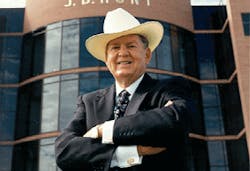Johnnie Bryan Hunt, founder and senior chairman of Lowell, AR-based truckload carrier J.B. Hunt Transport Services, is fully retiring from the company that he founded over 35 years ago effective Dec. 31, 2004 – and with him goes a slice of trucking history, according to many industry experts.
“He’s the classic American entrepreneur, someone who has the ability to see opportunities which no one else believes exist,” Donald Broughton, a veteran transportation analyst with St. Louis-based financial services firm A.G. Edwards, told Fleet Owner.
“For example, in the late 1980s and early 1990s, he started partnering with railroads to offer intermodal service,” Broughton added. “This was at a point in history when it was taboo for truckers to work with railroads. Today, however, 40% of the company’s revenues and 50% of its profits come from intermodal. That’s leading edge capitalism at work.”
“He’s a legendary figure in my opinion,” Satish Jindel, president of Pittsburgh-based SJ Consulting, told Fleet Owner. “J.B. Hunt not only built one of the largest truckload carriers in the country and recognized intermodal opportunities, he assembled a great management team to continue guiding his company. So while he will be missed, the performance of his company won’t change.”
It’s a company, and a livelihood, that Hunt literally built from nothing. Born in 1927 in Cleburne County, AR, he grew up during the depression, leaving school after the 7th grade at the age of 12 to work in his uncle’s sawmill so the family could survive. After a stint in the Army, Hunt spent the 1950s as a lumber salesman, auctioneer, and truck driver before starting a rice hull business with his wife Johnelle in 1961 – promptly losing $19,000.
He moved back into trucking in 1969, starting J.B. Hunt Transport with just five trucks and seven refrigerated trailers to support the rice hull business. By 1983, Hunt’s trucking ‘sideline’ had grown into the 80th largest trucking firm in the U.S. and earned $63 million in revenue, operating 550 tractors, 1,049 trailers, and employing 1,050. As a result, Hunt sold his rice hull business to concentrate solely on trucking, taking the company public that year.
By 2004, Hunt grew into the second largest truckload carrier in the U.S., with $2.33 billion in revenues, 11,000 trucks, 47,000 trailers and 16,000 employees. His 20.7% stake in the company that bears his name is worth some $741 million.
Though he stepped down as president in 1982, Hunt remained chairman until 1995 – and an active one at that, organizing the company’s now-famous venture into intermodal in 1989. He also launched flatbed and specialized trucking service businesses that he later sold off.
“The ideas were solid but the timing just wasn’t right,” said SJ Consulting’s Jindel. “That showed his other strength – knowing when to step back.”
Though known for his gregarious, outspoken character, Hunt never sought the media spotlight, building his company quietly along the same lines as Wal-Mart founder Sam Walton. “He’s kept a very low profile, but that doesn’t mean he hasn’t been driven.” Jindel said. “He’s been very focused on trying to bring new services and efficiencies to his trucking business ever since he started it.”
Hunt became senior chairman in 1995 – turning day-to-day and strategic control of his company over to chairman Wayne Garrison, president & CEO Kirk Thompson, and his son, vice chairman Bryan Hunt. And though he’s leaving trucking for good now, it won’t be an idle retirement – he plans to focus his prodigious energies on his commercial real estate company, The Pinnacle Group.
“This is just one more step in my retirement plan,” Hunt said in a prepared statement. “The company is in good hands. We have made tremendous improvements in profitability in the last several years and I am extremely optimistic about the future. The company’s brightest days lie ahead and I look forward to watching the continuing improvement.”
About the Author
Sean Kilcarr
Editor in Chief
Sean Kilcarr is a former longtime FleetOwner senior editor who wrote for the publication from 2000 to 2018. He served as editor-in-chief from 2017 to 2018.
